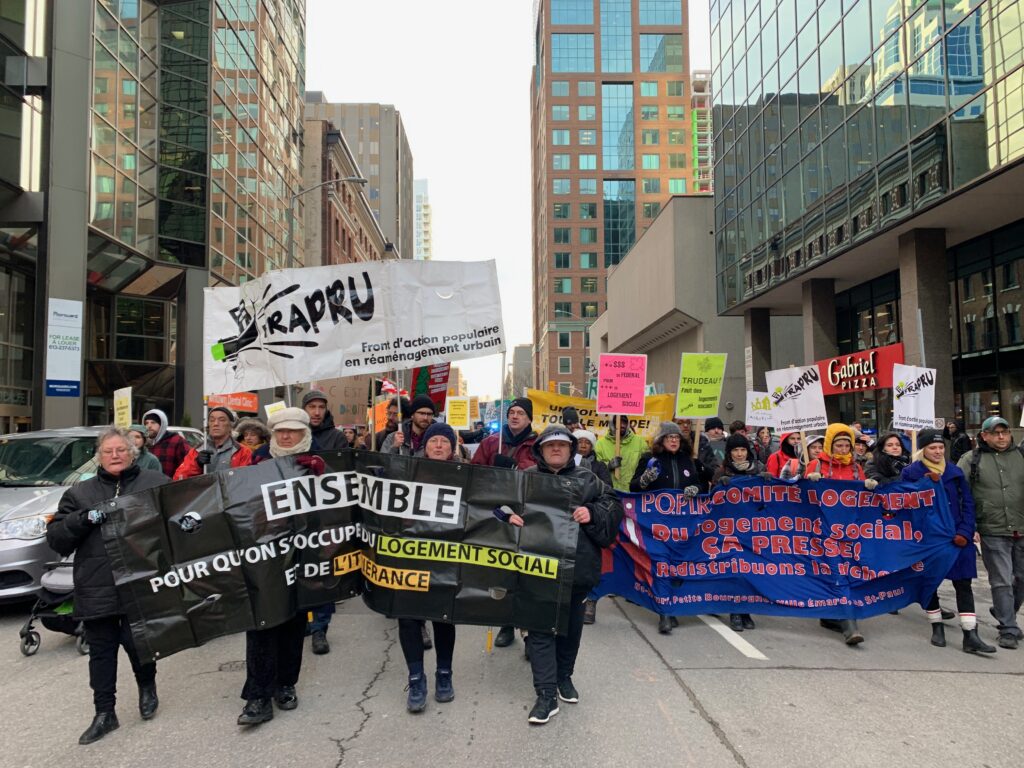
Ottawa, 10 December 2019 – More than 200 members of FRAPRU (the popular action front for urban redevelopment) and RSIQ (the Quebec homelessness solidarity network), from Outaouais, Montreal and Monteregie, demonstrated in Ottawa this afternoon, just days after Parliament resumed. They demanded that the Trudeau government and opposition parties make the housing and homelessness crisis raging in Quebec and the rest of Canada a real priority. The two networks demanded new budgetary investments which the minority government will have to negotiate with opposition parties.
Homeless camps, like the one behind Bayview station in Ottawa, are on the rise across Canada; shelters are overflowing in many Quebec cities. FRAPRU and RSIQ are concerned by the rapid worsening of the problems of housing and homelessness, both visible and hidden, resulting from the shortage of rental housing. According to the last census, taken in 2016, 1.2 million rental households in Canada, including 244,120 in Quebec, were in urgent need of housing because their current residence was too expensive, too small, or unsanitary. Food banks across the country report an increase in use, attributed to the high cost of housing.
“Property speculation and the scarcity of rental housing are contributing to a vicious increase in rent prices. Many low-income renters have already been driven out of their neighbourhoods, out of downtown areas; many are forced to live in unsuitable locations, far from services and support networks,” declared Véronique Laflamme, spokesperson for FRAPRU. “Homelessness is on the rise and makeshift camps are multiplying.”
“Housing resources are overwhelmed, thousands are turned away for lack of space, and the housing crisis rages on – federal funding for the fight against homelessness must rapidly increase to meet urgent needs and put in place long-term solutions,” added Laury Bacro, RSIQ coordinator.
“Everywhere we look, social housing needs are crying out,” the two spokespeople said.
In its March 2016 report, the UN Committee on Economic, Social and Cultural Rights expressed concern about the scarcity of social housing in Canada and Quebec. However, the federal government has done little since then to remedy the situation.
“In Quebec, we have rarely seen so few social housing units open as in the last three years,” declared Véronique Laflamme. In her view, “the National Housing Strategy’s current investment levels result in unaffordable housing, far out of the reach of the rental households the government says it wants to help.”
Laury Bacro agrees. “Federal homelessness policies which tend to impose a coordinated access system in Quebec oriented towards private rentals for homeless people are a dead end. We can’t simply direct them towards places which don’t exist or are financially inaccessible. Preventive action must also be taken, building social housing for families and individuals at risk of homelessness,” she explained.
In addition to the need for more social housing, federal support for housing built before 1994 is soon set to end and many units are in a deplorable condition. In Quebec alone, it is estimated that $420 million will be needed annually to restore the approximately 75,000 public housing units to decent condition.
“With such pressing needs, we don’t have the luxury to lose existing social housing,” Véronique Laflamme pointed out.
During the campaign which led to its re-election at the head of a minority government, the Liberal Party of Canada simply announced that it would pursue strategy objectives on housing established in 2017, and went no further.
The Bloc Quebecois and the NDP, parties now holding the balance of power, promised ambitious sums for social housing. The two networks call on these parties to honour their promises and make this an essential issue in pre-budget negotiations.
FRAPRU and RSIQ are asking for $2 billion per year to be allocated specifically for new social housing, in addition to the necessary funds for maintaining or restoring existing social housing. They ask Ottawa to sign the agreement with Quebec coming out of the housing strategy so that Quebec has its fair share of federal funds and can invest in its own social housing programme without delay. The groups also want the funding needed to effectively fight homelessness, both for reduction and prevention. They believe that at least $50 million a year should go to Quebec, without any policies imposed.
-30-
For information and interview requests:
Véronique Laflamme, FRAPRU: office 514 522-1010; cell 418-956-3403.
Laury Bacro, RSIQ: office 514 861-0202; cell 514 662-4733.
